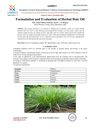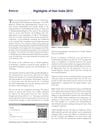 3 citations,
June 2004 in “Alternative and Complementary Therapies”
3 citations,
June 2004 in “Alternative and Complementary Therapies” The document concludes that hair loss is influenced by genetics and other factors, and while treatments like finasteride can help, they have limitations and side effects.
February 2024 in “Cosmetics” The conclusion is that new plant-based treatments for hair loss may work by targeting certain enzymes.
 3 citations,
October 2024 in “International Journal of Advanced Research in Science Communication and Technology”
3 citations,
October 2024 in “International Journal of Advanced Research in Science Communication and Technology” Lemongrass hair oil is effective for hair growth and scalp health.
 May 2020 in “Current developments in nutrition”
May 2020 in “Current developments in nutrition” Low dose finasteride doesn't change lipid profile or metabolic parameters in mice.
16 citations,
January 2017 in “DOAJ (DOAJ: Directory of Open Access Journals)” Low levels of vitamin B12 and ferritin are linked to early hair graying.
 January 2024 in “International Research Journal Of Modernization In Engineering Technology And Science”
January 2024 in “International Research Journal Of Modernization In Engineering Technology And Science” Hair growth serums reduce hair fall and improve growth with mostly positive reviews.
 73 citations,
July 2016 in “Cosmetics”
73 citations,
July 2016 in “Cosmetics” Mushrooms have beneficial properties for skin and hair care products and have great potential for future cosmetic use.
 September 2023 in “Medicine”
September 2023 in “Medicine” Herbal extract spray improved hair growth in a man with hair loss.
 1 citations,
January 2012 in “International Journal of Trichology”
1 citations,
January 2012 in “International Journal of Trichology” Hair India 2012 was a successful international event focused on combating fake trichology practices and discussing various hair health topics.
 January 2023 in “International journal of homoeopathic sciences”
January 2023 in “International journal of homoeopathic sciences” The document says homoeopathic treatments are good for hair regrowth in alopecia areata but doesn't give proof.
 2 citations,
November 2019 in “Phytotherapy Research”
2 citations,
November 2019 in “Phytotherapy Research” Pea sprout extract is safe and effectively reduces hair loss.
3 citations,
September 2016 in “Clinical, cosmetic and investigational dermatology” Sphinganine can reduce hair loss and improve scalp health.

Different types of hair loss can be caused by hormones, stress, autoimmune disorders, illness, or nutritional deficiencies, and can be treated with medication, nutritional supplements, or hair transplantation.
 September 2023 in “Clinical, cosmetic and investigational dermatology”
September 2023 in “Clinical, cosmetic and investigational dermatology” SLFC can improve scalp health and reduce sensitive scalp symptoms.
 January 2025 in “International Journal of Advanced Research in Science Communication and Technology”
January 2025 in “International Journal of Advanced Research in Science Communication and Technology” Polyherbal hair dyes are safer and more eco-friendly than chemical dyes.
 1 citations,
May 2016 in “Current Opinion in Pediatrics”
1 citations,
May 2016 in “Current Opinion in Pediatrics” Children's hair loss can be caused by various factors and should be treated with appropriate, age-specific methods and psychological support.
 3 citations,
May 2014 in “InTech eBooks”
3 citations,
May 2014 in “InTech eBooks” Copper deficiency may cause hair loss, and treating it could involve nutrition and hormones.
 49 citations,
February 2019 in “The Journal of Clinical Endocrinology and Metabolism”
49 citations,
February 2019 in “The Journal of Clinical Endocrinology and Metabolism” Use "female pattern hair loss" term, assess androgen excess, treat with minoxidil and other medications if needed.
 1 citations,
September 2015 in “Clinics in Dermatology”
1 citations,
September 2015 in “Clinics in Dermatology” Children's skin diseases and treatments differ from adults and require specific approaches.
 70 citations,
June 2010 in “Clinics in Dermatology”
70 citations,
June 2010 in “Clinics in Dermatology” Certain groups may need vitamin supplements to improve hair health and prevent other health problems.
 26 citations,
August 2018 in “American Journal of Clinical Dermatology”
26 citations,
August 2018 in “American Journal of Clinical Dermatology” Hair loss in cancer patients can be related to the cancer itself, treatment, or other conditions, and understanding it is important for diagnosis and patient care.
 September 2024 in “Research Square (Research Square)”
September 2024 in “Research Square (Research Square)” Low-level laser therapy effectively treats hair loss and promotes hair growth.
14 citations,
July 1977 in “PubMed” Applying linoleic acid to the skin fixed essential fatty acid deficiency symptoms.
 October 2024 in “Cosmoderma”
October 2024 in “Cosmoderma” Proper hair care and suitable products are essential for men's scalp health and well-being.
 June 2021 in “Journal of Emerging Technologies and Innovative Research”
June 2021 in “Journal of Emerging Technologies and Innovative Research” Rice water and hibiscus can help improve hair health and growth.
 15 citations,
October 2017 in “Dermatologic Clinics”
15 citations,
October 2017 in “Dermatologic Clinics” New treatments for male hair loss show promise but need more research for safety and effectiveness.
 48 citations,
February 2017 in “Journal of Cosmetic Dermatology”
48 citations,
February 2017 in “Journal of Cosmetic Dermatology” The conclusion is to use scalp cooling, gentle hair care, and treatments like minoxidil for managing hair loss from chemotherapy, and stresses the need for more research and collaboration in this area.

Good nutrition may help prevent premature hair graying.
 149 citations,
June 2002 in “British Journal of Dermatology”
149 citations,
June 2002 in “British Journal of Dermatology” Minoxidil works better for female hair loss, but cyproterone reduces scalp oiliness and causes menstrual issues.
 1 citations,
June 2015 in “Australasian Journal of Dermatology”
1 citations,
June 2015 in “Australasian Journal of Dermatology” A patient with Cronkhite-Canada syndrome improved with nutritional support and steroids, but early diagnosis is key due to high mortality.

























